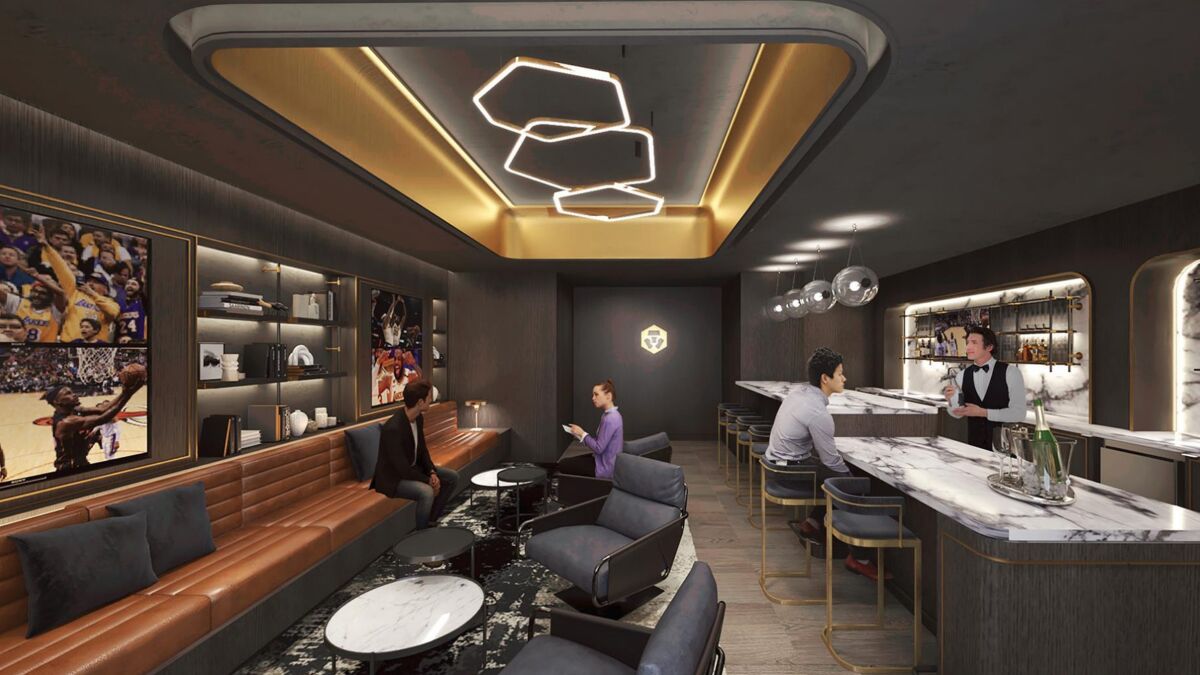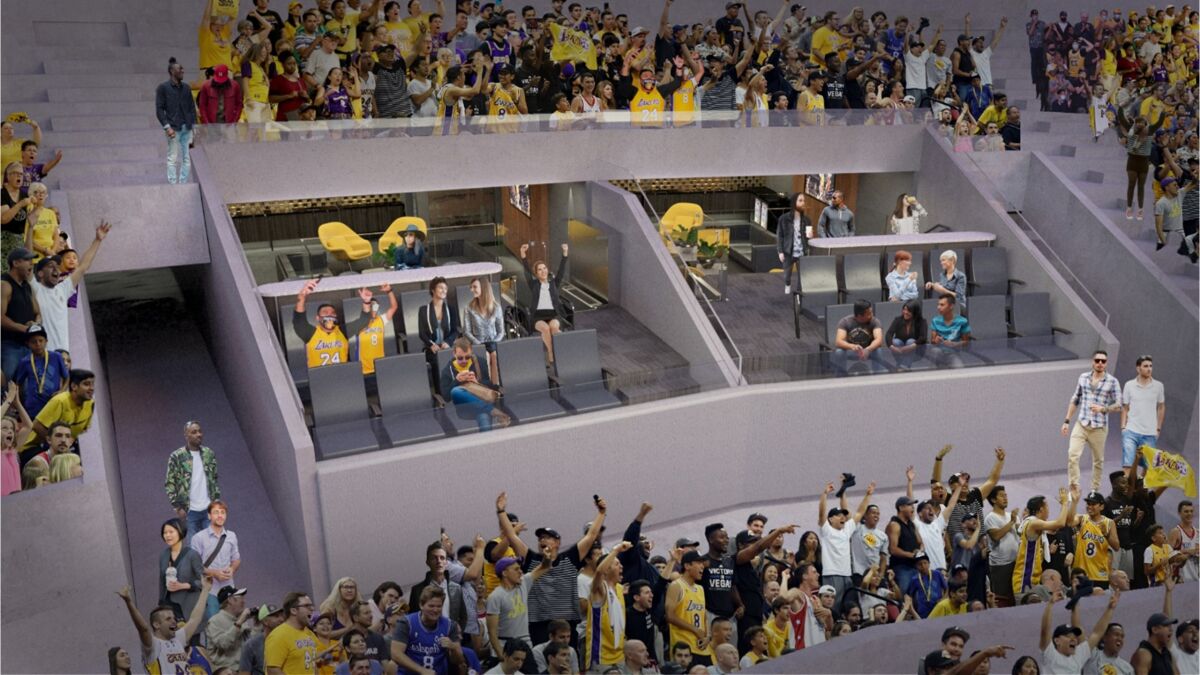Crypto.com Arena unveils suites reached through players’ entrance
With exclusivity an eternal quest in wealthy, celebrity-rich Los Angeles, the owners of Crypto.com Arena have come up with a way to combine front-row seating with luxury suites for a select few who can swing the staggering price of entry. The golden perk: Holders will enter the arena through the same private tunnel used by players and performers.
Owner AEG just publicly revealed its “tunnel suites,” which are under construction as part of a three-year renovation of the downtown venue where pro basketball and hockey teams play, top musical acts perform and the annual Grammy Awards are held.
Tunnel suite holders will be able to attend all of those events while making their entrance down the ramp used by the Lakers, Kings, Clippers, Sparks and artists such as Drake, Eric Clapton and Anita Baker, all of whom are set to perform this year.
“Ramp access is so golden,” said Michele Kajiwara, head of premium sales at the arena.
And the few who arrive via tunnel will be the first in the arena’s 24-year history to gain entry to private special events such as the Grammys, All-Star games and 2028 Olympic competitions that are not routinely open to owners of other suites or premiere seats.
AEG declined to reveal exactly how much the new suites cost or even how much the company is spending to upgrade the sports and entertainment venue, but estimates reveal the sums are vast as AEG strives to keep Crypto.com one of the top-grossing arenas in the country.
When the Lakers agreed to stay for another 20 years in 2021, it was with the understanding that AEG would perform at least $100 million in capital improvements to the arena, which cost $375 million to build in 1999.
The makeover was designed by the Gensler architectural firm and sports facility architect Dan Meis, and has been approved by the Lakers and Kings, AEG said.
Among the most notable improvements will be the four private tunnel suites and four “terrace suites” slightly higher on the main concourse that are being carved out of existing premium seating. All eight new suites sit lower than the original 170 luxury suites that ring the arena, and are already being snatched up; AEG has sold five of them before going public, relying on personal approaches to people with the means to buy them.
That translates to a long-term commitment to spend tens of millions of dollars. AEG said it has sold two of the tunnel suites and three of the terrace suites, producing a combined total of more than $300 million in commitments, or roughly $60 million per suite over the life of 10-year or 20-year contracts.
“There’s a certain cachet that comes with whoever is going to be buying these,” Kajiwara said, “because they want the best of the best.”
Four “terrace suites” are being carved out of existing premium seating on the main concourse at Crypto.com Arena.
(Crypto.com Arena / AEG)
The pool of potential buyers is small, she acknowledged. “We are talking to private equity [investors], billionaires — anyone who can look at seven figures over double-digit years and not feel stretched to have to justify it.”
But having the money is not quite enough in the case of tunnel suites, which are close together and occupants are likely to encounter one another on occasion. AEG is screening buyers.
“You’ve got to have a certain decorum,” she said. “You know how to entertain, hold company and network in that kind of space.”
Bay Area real estate consultant David Greensfelder, who is not involved in the project, says the new suites are intended to arouse the sensibilities of people who are rarely gobsmacked by their surroundings.
“When you’ve got a lot of money that gives you access to just about anything, it takes a lot to have a where-the-hell-am-I experience,” he said. “That’s what they’re trying to do.”
Such reactions could be good for suite owners’ business dealings, he said, making guests “feel good and important” and encouraging “whatever celebrity to agree to play whatever role in whatever movie, or whatever Netflix series, or whatever investor to invest in the C round of whatever tech company.”
The tunnel suites will have a capacity of 12, with most of the space in their roomy private lounge below the seats and out of sight of the arena. If occupants want to watch the game live, they can take a few steps up to their seats to pop out in sight of an audience of thousands and perhaps television cameras.
“You will have total privacy and also high visibility in the most exclusive place that you can show up,” Kajiwara said.
Owners can stock their suites with their private wine and liquor collections, but food and alcoholic beverages will be provided at no extra charge.

Crypto.com Arena’s “tunnel suites” will have a capacity of 12, with most of the space in a roomy private lounge below the seats and out of sight of the arena.
(Crypto.com Arena / AEG)
The terrace suites are by contrast easily visible to the rest of the arena, luxurious dens for 14 on the main concourse. They come with tickets to all games, including playoffs, as well as concerts and shows.
Even though the arena has the advantage of being home to four pro sports teams, upgrading the aging venue is a necessity in the competitive Los Angeles entertainment market, said Lee Zeidman, president of Crypto.com Arena, the Peacock Theater and L.A. Live.
“You want to make sure your house stays the shiniest and prettiest on the block,” said Zeidman, who is overseeing the makeover, now in its second year.
A big competitor on the horizon is the Intuit Dome, a $1.2-billion showplace being built in Inglewood that will be the new home of the Clippers after they play one more season at Crypto.com Arena. The Intuit Dome will have lower-level suites known as “courtside cabanas” and “backstage bungalows.”
Other competitive venues include Kroenke Sports & Entertainment’s YouTube Theater in Inglewood that opened in 2021 near Kroenke’s SoFi Stadium, where the Rams and Chargers play football, the Kia Forum in Inglewood and the Los Angeles Memorial Coliseum, Zeidman said.
He added: “We compete against the Greek Theatre, the Shrine Auditorium, the Honda Center and BMO Stadium,” where the Los Angeles Football Club and Angel City Football Club play soccer and concerts are held.
AEG is racing to stay on schedule with the second phase of the renovation, with 90-person crews working two shifts a day, as many as seven days a week, he said. Cleaning crews follow behind to mop up the dust before Sparks games and other events.
“It’s a race to the finish,” Zeidman said. “We’ve got to be ready first week of October to operate everything” when the Lakers, Clippers and Kings return.
Improvements are taking place at every level over the course of three summers of renovation.

Crypto.Com Arena’s “terrace suites,” luxurious dens for 14, come with tickets to all games, including playoffs, as well as concerts and shows.
(Crypto.com Arena / AEG)
Along with customary changes — new jumbo screens, updated concession stands, a better sound system — the project will follow industry trends that emphasize “fan experience” over simply walking in and finding a seat.
At Crypto.com, that means eliminating the street between the arena and L.A. Live to create a tree-lined public plaza with music and big-tent attractions. It means adding a glass-walled Tunnel Club where patrons can watch players file out of their locker rooms.
More significantly, crews will blast out the upper seats at one end, creating an indoor/outdoor space called City Terrace where fans can mingle on a terrace overlooking downtown, then stroll inside the bowl to peer down on the court.
“We have so much entertainment, so much night life and natural activities in Los Angeles, how do you compete?” Kajiwara said. “You create something that’s special, that’s in the moment.”
Times staff writer David Wharton contributed to this report.